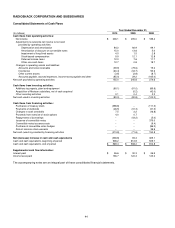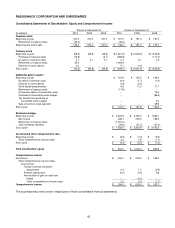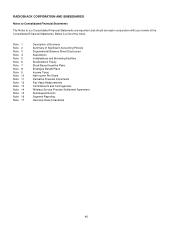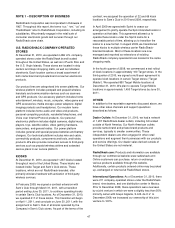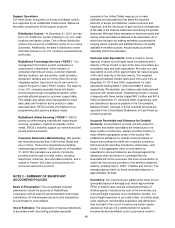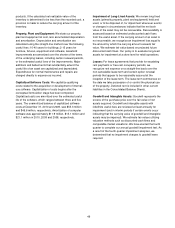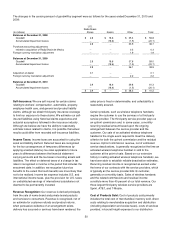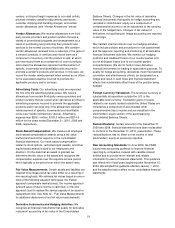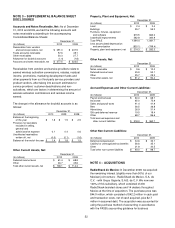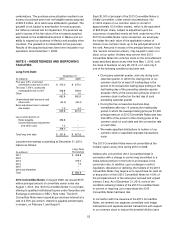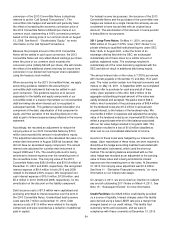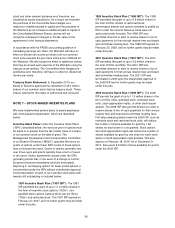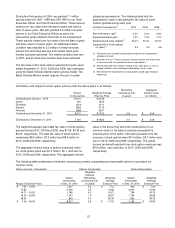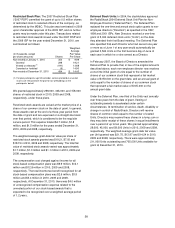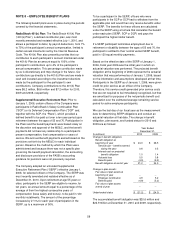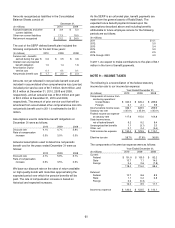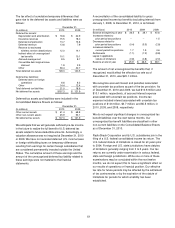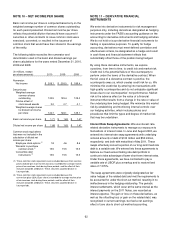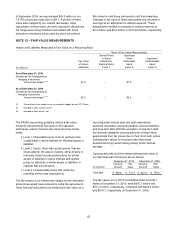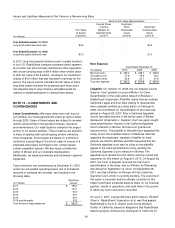Radio Shack 2010 Annual Report Download - page 64
Download and view the complete annual report
Please find page 64 of the 2010 Radio Shack annual report below. You can navigate through the pages in the report by either clicking on the pages listed below, or by using the keyword search tool below to find specific information within the annual report.54
conversion of the 2013 Convertible Notes (collectively
referred to as the “Call Spread Transactions”). The
convertible note hedges and warrants will generally have
the effect of increasing the economic conversion price of
the 2013 Convertible Notes to $36.60 per share of our
common stock, representing a 100% conversion premium
based on the closing price of our common stock on August
12, 2008. See Note 6 - “Stockholders’ Equity,” for more
information on the Call Spread Transactions.
Because the principal amount of the 2013 Convertible
Notes will be settled in cash upon conversion, the 2013
Convertible Notes will only affect diluted earnings per share
when the price of our common stock exceeds the
conversion price (initially $24.25 per share). We will include
the effect of the additional shares that may be issued from
conversion in our diluted net income per share calculation
using the treasury stock method.
When accounting for the 2013 Convertible Notes, we apply
accounting guidance related to the accounting for
convertible debt instruments that may be settled in cash
upon conversion. This guidance requires us to account
separately for the liability and equity components of our
convertible notes in a manner that reflects our nonconvertible
debt borrowing rate when interest cost is recognized in
subsequent periods. This guidance requires bifurcation of a
component of the debt, classification of that component in
equity, and then accretion of the resulting discount on the
debt as part of interest expense being reflected in the income
statement.
Accordingly, we recorded an adjustment to reduce the
carrying value of our 2013 Convertible Notes by $73.0
million and recorded this amount in stockholders’ equity.
This adjustment was based on the calculated fair value of a
similar debt instrument in August 2008 (at issuance) that
did not have an associated equity component. The annual
interest rate calculated for a similar debt instrument in
August 2008 was 7.6%. The resulting discount is being
amortized to interest expense over the remaining term of
the convertible notes. The carrying value of the 2013
Convertible Notes was $330.8 million and $315.8 million at
December 31, 2010 and 2009, respectively. We recognized
interest expense of $9.4 million in both 2010 and 2009
related to the stated 2.50% coupon. We recognized non-
cash interest expense of $15.0 million, $13.8 million, and
$5.0 million in 2010, 2009 and 2008, respectively, for the
amortization of the discount on the liability component.
Debt issuance costs of $7.5 million were capitalized and
are being amortized to interest expense over the term of
the 2013 Convertible Notes. Unamortized debt issuance
costs were $3.7 million at December 31, 2010. Debt
issuance costs of $1.9 million were related to the equity
component and were recorded as a reduction of additional
paid-in capital.
For federal income tax purposes, the issuance of the 2013
Convertible Notes and the purchase of the convertible note
hedges are treated as a single transaction whereby we are
considered to have issued debt with an original issue
discount. The amortization of this discount in future periods
is deductible for tax purposes.
2011 Long-Term Notes: On May 11, 2001, we issued
$350 million of 10-year 7.375% notes (“2011 Notes”) in a
private offering to qualified institutional buyers under SEC
Rule 144A. In August 2001, under the terms of an
exchange offering filed with the SEC, we exchanged
substantially all of these notes for a similar amount of
publicly registered notes. The exchange resulted in
substantially all of the notes becoming registered with the
SEC and did not result in additional debt being issued.
The annual interest rate on the notes is 7.375% per annum,
with interest payable on November 15 and May 15 of each
year. The notes contain certain non-financial covenants and
mature on May 15, 2011. In September 2009, we completed
a tender offer to purchase for cash any and all of these
notes. Upon expiration of the offer, $43.2 million of the
aggregate outstanding principal amount of the notes was
validly tendered and accepted. We paid a total of $46.6
million, which consisted of the purchase price of $45.4 million
for the tendered notes plus $1.2 million in accrued and
unpaid interest, to the holders of the tendered notes. We
incurred $0.2 million in expenses and adjusted the carrying
value of the tendered notes by an incremental $0.8 million to
reflect a proportionate write-off of the balance associated
with our fair value hedge included in long-term debt. This
transaction resulted in a loss of $1.6 million classified as
other loss on our consolidated statements of income.
A portion of these notes were hedged by our interest rate
swaps. Upon repurchase of these notes, we were required to
discontinue the hedge accounting treatment associated with
these derivative instruments, which used the short-cut
method. The remaining balance associated with our fair
value hedge was recorded as an adjustment to the carrying
value of these notes and is being amortized to interest
expense over the remaining term of the notes. At December
31, 2010, this carrying value adjustment was $1.2 million.
See Note 11 - “Derivative Financial Instruments,” for more
information on our interest rate swaps.
On January 4, 2011, we announced our intention to redeem
any and all outstanding 2011 Notes on March 4, 2011. See
Note 15 - “Subsequent Events” for more information.
Credit Facilities: Our $325 million credit facility provided
us a source of liquidity. Interest charges under this facility
were derived using a base LIBOR rate plus a margin that
changed based on our credit ratings. This facility had
customary terms and covenants, and we were in
compliance with these covenants at December 31, 2010.


